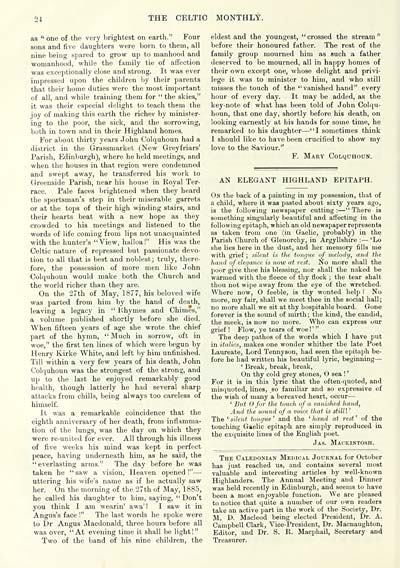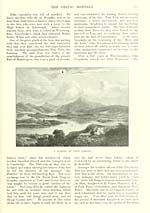Blair Collection > Celtic monthly > Volume 7, 1899
(44)
Download files
Complete book:
Individual page:
Thumbnail gallery: Grid view | List view

u
THE CELTIC MONTHLY.
aa " one of the very brightest on earth." Four
sons and five daughters were born to them, all
nine being spared to grow up to manhood and
womanhood, while the family tie of aflection
was exceptionally close and strong. It was ever
impressed upon the children by their parents
that their home duties were the most important
of all, and while training them for " the skies,"
it was their especial delight to teach them the
joy of making this earth the richer by minister-
ing to the poor, the sick, and the sorrowing,
both in town and in their Highland homes.
For about thirty years John Colquhoun had a
district in the Grassmarket (New Greyfriars'
Parish, Edinburgh), where he held meetings, and
when the houses in that region were condemned
and swept away, he transferred his work to
Greenside Parish, near his house in Royal Ter-
race. Pale faces brightened when they heard
the sportsman's step in their miserable garrets
or at the tops of their high winding stairs, and
their hearts beat with a new hope as they
crowded to his meetings and listened to the
words of life coming from lips not unacquainted
with the hunter's "View, halloa!" His was the
Celtic nature of repressed but passionate devo-
tion to all that is best and noblest; truly, there-
fore, the possession of more men like John
Colquhoun would make both the Church and
the world richer than they are.
On the 27th of May, 1877, his beloved wife
was parted from him by the hand of death,
leaving a legacy in " Khymes and Chimes,"
a volume published shortly before she died.
When fifteen years of age she wrote the chief
part of the hymn, " Much in sorrow, oft in
woe," the first ten lines of which were begun by
Henry Kirke White, and left by him unfinished.
Till within a very few years of his death, John
Colquhoun was the strongest of the strong, and
up to the last he enjoyed remarkably good
health, though latterly he had several sharp
attacks from chills, being always too careless of
himself.
It was a remarkable coincidence that the
eighth anniversary of her death, from inflamma-
tion of the lungs, was the day on which they
were re-united for ever. All through his illness
of five weeks his mind was kept in perfect
peace, having underneath him, as he said, the
" everlasting arms." The day before he was
taken he " saw a vision, Heaven opened ■" —
uttering his wife's name as if he actually saw
her. On the morning of the 27th of May, 1885,
he called his daughter to him, saying, "Don't
you think I am wearin' awa'! I saw it in
Angus's face !" The last words he spoke were
to Dr Angus Macdonald, three hours before all
was over, "At evening time it shall be light!"
Two of the band of hi.s nine children, the
eldest and the youngest, " crossed the stream "
before their honoured father. The rest of the
family group mourned him as such a father
deserved to be mourned, all in happy homes of
their own except one, whose delight and privi-
lege it was to minister to him, and who still
misses the touch of the "vanished hand" every
hour of every day. It may be added, as the
key-note of what has been told of John Colqu-
houn, that one day, shortly before his death, on
looking earne.stly at his hands for some time, he
remarked to his daughter — "I sometimes think
I should like to have been crucified to show my
love to the Saviour."
F. Mary Colquhoun.
AN ELEGANT HIGHLAND EPITAPH.
On the back of a painting in my possession, that of
a child, where it was pasted about sixty years ago,
is the following newspaper cutting : — " There is
something singularly beautiful and aftecting in the
following epitaph, which an old newspaper represents
as taken from one (in Gaelic, probably) in the
Parish Church of Glenorchy, in Argyllshire ; — 'Lo
she lies here in the dust, and her memory fills me
with grief ; dlent is the tuiiyue of melvdy, and the
hand of eleijance is Jtoui at rest. No more shall the
poor give thee his blessing, nor shall the naked be
warmed with the fleece of thy flock ; the tear shalt
thou not wipe away from the eye of the wretched.
Where now, O feeble, is thy wonted help t No
more, my fair, shall we meet thee in the social hall;
no more shall we sit at thy hospitable board. Gone
forever is the sound of mirth ; the kind, the candid,
the meek, is now no more. Who can express our
grief ! Flow, ye tears of woe 1 ' "
The deep pathos of the words which I have put
in italics, makes one wonder whither the late Poet
Laureate, Lord Tennyson, had seen the epitaph be-
fore he had written his beautiful lyric, beginning —
' Break, break, break.
On thy cold grey stones, O sea ! '
For it is in this lyric that the often-quoted, and
misquoted, lines, so familiar and so expressive of
the wish of many a bereaved heart, occur —
' But for the touch of a vanished hand,
And the smmd of a voice that is still] '
The ' silent tongue ' and the ' hand at rest ' of the
touching Gaelic epitaph are simply reproduced in
the exquisite lines of the English poet.
Jas. Mackintosh.
The Caiedonian Medical Journal for October
has just reached us, and contains several most
valuable and interesting articles by well-known
Highlanders. The Annual Meeting and Dinner
was held recently in Edinburgh, and seems to have
been a most enjoyable function. We are pleased
to notice that quite a number of our own readers
take an active part in the work of the Society, Dr.
M. D. Macleod being elected President, Dr. A.
Campbell Clark, Vice-President, Dr. Macnaughton,
Editor, and Dr. S. R. Macphail, Secretary and
Treasurer.
THE CELTIC MONTHLY.
aa " one of the very brightest on earth." Four
sons and five daughters were born to them, all
nine being spared to grow up to manhood and
womanhood, while the family tie of aflection
was exceptionally close and strong. It was ever
impressed upon the children by their parents
that their home duties were the most important
of all, and while training them for " the skies,"
it was their especial delight to teach them the
joy of making this earth the richer by minister-
ing to the poor, the sick, and the sorrowing,
both in town and in their Highland homes.
For about thirty years John Colquhoun had a
district in the Grassmarket (New Greyfriars'
Parish, Edinburgh), where he held meetings, and
when the houses in that region were condemned
and swept away, he transferred his work to
Greenside Parish, near his house in Royal Ter-
race. Pale faces brightened when they heard
the sportsman's step in their miserable garrets
or at the tops of their high winding stairs, and
their hearts beat with a new hope as they
crowded to his meetings and listened to the
words of life coming from lips not unacquainted
with the hunter's "View, halloa!" His was the
Celtic nature of repressed but passionate devo-
tion to all that is best and noblest; truly, there-
fore, the possession of more men like John
Colquhoun would make both the Church and
the world richer than they are.
On the 27th of May, 1877, his beloved wife
was parted from him by the hand of death,
leaving a legacy in " Khymes and Chimes,"
a volume published shortly before she died.
When fifteen years of age she wrote the chief
part of the hymn, " Much in sorrow, oft in
woe," the first ten lines of which were begun by
Henry Kirke White, and left by him unfinished.
Till within a very few years of his death, John
Colquhoun was the strongest of the strong, and
up to the last he enjoyed remarkably good
health, though latterly he had several sharp
attacks from chills, being always too careless of
himself.
It was a remarkable coincidence that the
eighth anniversary of her death, from inflamma-
tion of the lungs, was the day on which they
were re-united for ever. All through his illness
of five weeks his mind was kept in perfect
peace, having underneath him, as he said, the
" everlasting arms." The day before he was
taken he " saw a vision, Heaven opened ■" —
uttering his wife's name as if he actually saw
her. On the morning of the 27th of May, 1885,
he called his daughter to him, saying, "Don't
you think I am wearin' awa'! I saw it in
Angus's face !" The last words he spoke were
to Dr Angus Macdonald, three hours before all
was over, "At evening time it shall be light!"
Two of the band of hi.s nine children, the
eldest and the youngest, " crossed the stream "
before their honoured father. The rest of the
family group mourned him as such a father
deserved to be mourned, all in happy homes of
their own except one, whose delight and privi-
lege it was to minister to him, and who still
misses the touch of the "vanished hand" every
hour of every day. It may be added, as the
key-note of what has been told of John Colqu-
houn, that one day, shortly before his death, on
looking earne.stly at his hands for some time, he
remarked to his daughter — "I sometimes think
I should like to have been crucified to show my
love to the Saviour."
F. Mary Colquhoun.
AN ELEGANT HIGHLAND EPITAPH.
On the back of a painting in my possession, that of
a child, where it was pasted about sixty years ago,
is the following newspaper cutting : — " There is
something singularly beautiful and aftecting in the
following epitaph, which an old newspaper represents
as taken from one (in Gaelic, probably) in the
Parish Church of Glenorchy, in Argyllshire ; — 'Lo
she lies here in the dust, and her memory fills me
with grief ; dlent is the tuiiyue of melvdy, and the
hand of eleijance is Jtoui at rest. No more shall the
poor give thee his blessing, nor shall the naked be
warmed with the fleece of thy flock ; the tear shalt
thou not wipe away from the eye of the wretched.
Where now, O feeble, is thy wonted help t No
more, my fair, shall we meet thee in the social hall;
no more shall we sit at thy hospitable board. Gone
forever is the sound of mirth ; the kind, the candid,
the meek, is now no more. Who can express our
grief ! Flow, ye tears of woe 1 ' "
The deep pathos of the words which I have put
in italics, makes one wonder whither the late Poet
Laureate, Lord Tennyson, had seen the epitaph be-
fore he had written his beautiful lyric, beginning —
' Break, break, break.
On thy cold grey stones, O sea ! '
For it is in this lyric that the often-quoted, and
misquoted, lines, so familiar and so expressive of
the wish of many a bereaved heart, occur —
' But for the touch of a vanished hand,
And the smmd of a voice that is still] '
The ' silent tongue ' and the ' hand at rest ' of the
touching Gaelic epitaph are simply reproduced in
the exquisite lines of the English poet.
Jas. Mackintosh.
The Caiedonian Medical Journal for October
has just reached us, and contains several most
valuable and interesting articles by well-known
Highlanders. The Annual Meeting and Dinner
was held recently in Edinburgh, and seems to have
been a most enjoyable function. We are pleased
to notice that quite a number of our own readers
take an active part in the work of the Society, Dr.
M. D. Macleod being elected President, Dr. A.
Campbell Clark, Vice-President, Dr. Macnaughton,
Editor, and Dr. S. R. Macphail, Secretary and
Treasurer.
Set display mode to: Large image | Transcription
Images and transcriptions on this page, including medium image downloads, may be used under the Creative Commons Attribution 4.0 International Licence unless otherwise stated. ![]()
| Early Gaelic Book Collections > Blair Collection > Celtic monthly > Volume 7, 1899 > (44) |
|---|
| Permanent URL | https://digital.nls.uk/75859078 |
|---|
| Shelfmark | Blair.59 |
|---|---|
| Additional NLS resources: | |
| Attribution and copyright: |
|
| Description | A selection of books from a collection of more than 500 titles, mostly on religious and literary topics. Also includes some material dealing with other Celtic languages and societies. Collection created towards the end of the 19th century by Lady Evelyn Stewart Murray. |
|---|
| Description | Selected items from five 'Special and Named Printed Collections'. Includes books in Gaelic and other Celtic languages, works about the Gaels, their languages, literature, culture and history. |
|---|

